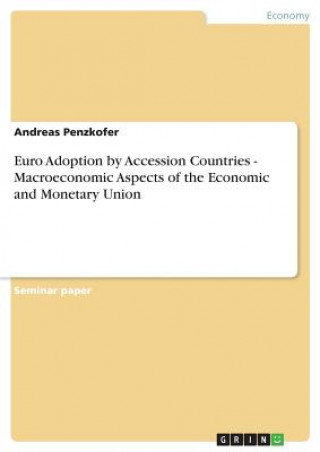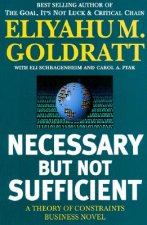
Kód: 01593968
Euro Adoption by Accession Countries - Macroeconomic Aspects of the Economic and Monetary Union
Autor Andreas Penzkofer
Seminar paper from the year 2006 in the subject Economics - Macro-economics, general, printed single-sided, grade: 1,0, Wayne State University (Department of Economics), course: Macroeconomics, 26 entries in the bibliography, lang ... celý popis
- Jazyk:
 Angličtina
Angličtina - Vazba: Brožovaná
- Počet stran: 36
Nakladatelství: Grin Publishing, 2008
- Více informací o knize

Mohlo by se vám také líbit
Darujte tuto knihu ještě dnes
- Objednejte knihu a zvolte Zaslat jako dárek.
- Obratem obdržíte darovací poukaz na knihu, který můžete ihned předat obdarovanému.
- Knihu zašleme na adresu obdarovaného, o nic se nestaráte.
Více informací o knize Euro Adoption by Accession Countries - Macroeconomic Aspects of the Economic and Monetary Union
Nákupem získáte 156 bodů
 Anotace knihy
Anotace knihy
Seminar paper from the year 2006 in the subject Economics - Macro-economics, general, printed single-sided, grade: 1,0, Wayne State University (Department of Economics), course: Macroeconomics, 26 entries in the bibliography, language: English, abstract: On 1st May 2004 ten new member states joined the European Union (EU), e.g. Estonia, Poland and Slovenia. The countries won t adopt the euro as their new currency immediately, because they first have to show that their economies have converged with the economy of the euro zone.Presently, the efforts and opinions of the new members differ about the adoption of the single currency. For instance, the Slovenian Prime Minister Janez Jansa told the press in February 2006 that there is nothing on the path ahead that could endanger the euro adoption in 2007. The government pursues a tight fiscal policy to meet all entry requirements. Recently, it introduced a dual pricing that means all prices of goods and services are marked in tolars as well as euros to raise consumer awareness in the preparation for the euro adoption.1 Contrarily, other countries are skeptical. The leader of the Polish conservative party Jaroslaw Kaczynski said during a campaign that he doesn t see any benefits in adopting the euro. Euro adoption would lead to lower exports, lower national income and higher unemployment. The Estonian Sirje Karu said in an interview, that Estonians are scared. We heard that when Finland adopted the euro, it took them quite a while to get used to it and prices increased. The poorest suffered. Using this situation as a background, it is interesting to analyze the euro adoption by accession states. How does the adoption process work? When should the euro be introduced and what macroeconomic effects does it have?
 Parametry knihy
Parametry knihy
Zařazení knihy Knihy v angličtině Economics, finance, business & management Economics
1557 Kč
- Plný název: Euro Adoption by Accession Countries - Macroeconomic Aspects of the Economic and Monetary Union
- Autor: Andreas Penzkofer
- Jazyk:
 Angličtina
Angličtina - Vazba: Brožovaná
- Počet stran: 36
- EAN: 9783638681131
- ISBN: 3638681130
- ID: 01593968
- Nakladatelství: Grin Publishing
- Hmotnost: 113 g
- Rozměry: 297 × 210 × 4 mm
- Datum vydání: 30. April 2008
Oblíbené z jiného soudku
-

Principles for Dealing with the Changing World Order
575 Kč -

Team Topologies
543 Kč -

Freakonomics
225 Kč -

Misbehaving - The Making of Behavioral Economics
298 Kč -

Indispensable Milton Friedman
646 Kč -

Little Book of Economics
276 Kč -

Why Nations Fail
205 Kč -

Pyramid Principle, The
1163 Kč -

Essential Mathematics for Economic Analysis
1840 Kč -

Economics In One Lesson
373 Kč -

Predictably Irrational
410 Kč -

Price of Inequality
298 Kč -

(Mis)Behaviour of Markets
357 Kč -

Debt, 10th Anniversary Edition
651 Kč -

A-Level Economics: Year 1 & 2 Complete Revision & Practice (with Online Edition)
699 Kč -

The Invisible Hand
185 Kč -

Liar's Poker
304 Kč -

Rational Optimist
307 Kč -

Irrational Exuberance
486 Kč -

Art of Statistics
323 Kč -

Scrum - A Pocket Guide - 3rd edition
562 Kč -

Hypomanic Edge
505 Kč -

How I Made One Million Dollars Last Year Trading Commodities
1009 Kč -

Misbehavior of Markets
584 Kč -

Econometric Analysis, Global Edition
2223 Kč -

Cartoon Introduction to Economics
462 Kč -

Economics: The User's Guide
378 Kč -

Rise of Carry: The Dangerous Consequences of Volatility Suppression and the New Financial Order of Decaying Growth and Recurring Crisis
644 Kč -

Myth of Capitalism - Monopolies and the Death of Competition
537 Kč -

How Rich Countries Got Rich and Why Poor Countries Stay Poor
410 Kč -

Business Etiquette in Brief
311 Kč -

Intermediate Microeconomics and Its Application
2616 Kč -

Discovery, Capitalism & Distributive Justice
552 Kč -

Economic Point of View
667 Kč -

Are the Rich Necessary?
312 Kč -

Driving Digital Transformation
543 Kč -

Start-Up Nation
268 Kč -

Economic Facts and Fallacies
423 Kč -

Decision Book
375 Kč -

Necessary but Not Sufficient
419 Kč -

Freakonomics
181 Kč -

Economics Book
564 Kč -

Leading at a Higher Level
799 Kč -

Principles of Economics
392 Kč -

Macroeconomics For Dummies
581 Kč -

45 Second Presentation That Will Change Your Life
243 Kč -

Economics of the Public Sector
2059 Kč -

Factfulness
258 Kč -

Currency Wars
416 Kč
Osobní odběr Praha, Brno a 12903 dalších
Copyright ©2008-24 nejlevnejsi-knihy.cz Všechna práva vyhrazenaSoukromíCookies










 Vrácení do měsíce
Vrácení do měsíce 571 999 099 (8-15.30h)
571 999 099 (8-15.30h)